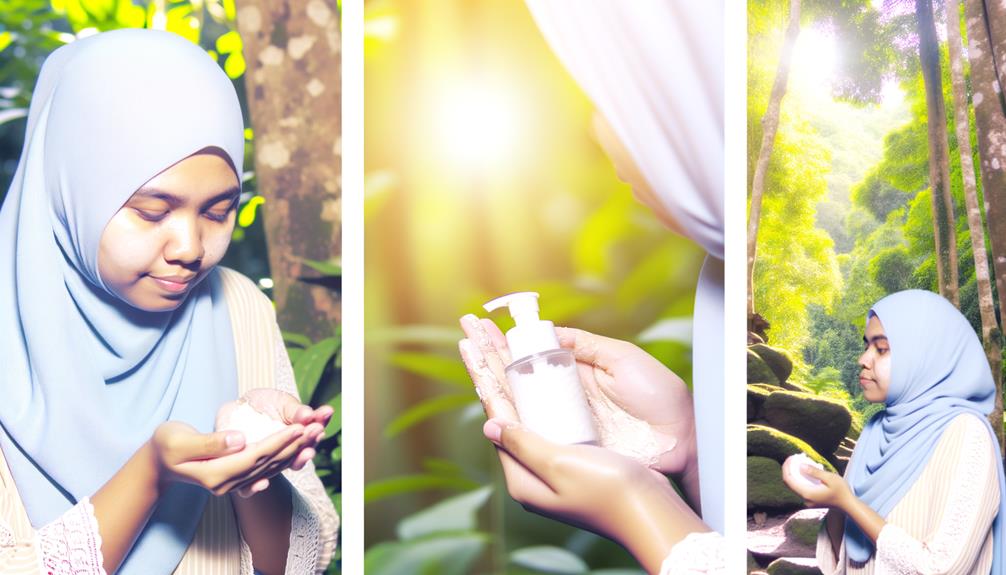
For those seeking to achieve a deep, sun-kissed tan, understanding the nuances of tanning in the sun is crucial. It involves more than just lounging under the sun; rather, it requires a thoughtful and methodical approach to both the tanning process and skin care.
By implementing specific techniques and being mindful of skin health, individuals can attain a dark tan while minimizing potential risks. From pre-tanning preparations to effective maintenance, the journey to a dark tan in the sun encompasses various aspects that warrant careful consideration.
Key Takeaways
- Exfoliate your skin the night before tanning to remove dead skin cells and promote an even tan.
- Moisturize your skin before and after tanning to keep it hydrated and prevent dryness.
- Apply sunscreen with at least 15 SPF 30 minutes before going outside to protect your skin from harmful UV rays.
- Change positions every 15 to 30 minutes while tanning to ensure an even and dark tan.
Preparing Your Skin for Tanning

Preparing your skin for tanning requires proper exfoliation and hydration to ensure an even and long-lasting tan. Begin by exfoliating your skin the night before using a loofah, bath sponge, or natural scrub product to remove dead skin cells. This step creates a smooth surface for tanning and helps the tan last longer.
After exfoliation, moisturize your skin with a rich lotion to keep it hydrated and prevent dryness, which can lead to an uneven tan. Additionally, drink plenty of water to maintain skin hydration from within. Hydrated skin tans more evenly and retains the tan for a longer period.
These steps not only ensure a deeper tan but also contribute to skin health. By following these preparatory measures, you can maximize the effectiveness of your tanning session and achieve a golden, dark tan naturally.
Tanning Techniques for a Dark Tan
After properly preparing your skin for tanning through exfoliation and hydration, it's essential to employ effective techniques to achieve a dark tan while minimizing the risks of sun exposure. Here are some tanning techniques for a dark tan:
| Tanning Techniques | Description |
|---|---|
| Change Positions Regularly | Rotate every 15-30 mins for even color distribution. |
| Avoid Sunscreen | Skip sunscreen during tanning to allow your skin to darken. |
| Hydration is Key | Stay hydrated by drinking water while tanning to maintain skin health. |
| Caution with Sunburn | Be cautious of sunburn, as it can prevent your skin from tanning. |
| Moderate Sun Exposure | Avoid excessive sun exposure to prevent skin damage and premature aging. |
Maintenance for a Long-Lasting Tan
To maintain a long-lasting tan, it is essential to prioritize regular moisturization and cautious exfoliation to prevent premature fading and ensure skin health.
- Moisturize Daily: Apply a rich lotion or moisturizer to your skin every day to keep it hydrated and prevent dryness, flaking, and premature fading of your tan.
- Avoid Excessive Exfoliation: Be cautious with exfoliation to avoid stripping away the outer layer of your skin, which can cause your tan to fade faster. Limit exfoliation to once or twice a week.
- Use Self-Tanning Products: Incorporate self-tanning products into your routine to enhance and prolong your tan. Choose products that complement your skin tone for a natural and longer-lasting tan.
- Protect Your Skin: Wear sunscreen with at least 15 SPF daily to shield your skin from harmful UV rays, prevent premature fading, and maintain a healthy tan.
Tips for Enhancing Your Tan
To maintain and enhance your tan, it's important to incorporate specific tips and practices while ensuring the long-lasting effects of your tanning efforts.
If you're wondering how to get a dark tan in one day, consider using tan-enhancing lotions or oils to intensify your tan. These products can help you achieve the darkest tan possible and deepen your tan faster.
Additionally, consider eating a healthy diet rich in fruits and vegetables to support skin health, as this can help you get the best tan in the sun.
To get a deep tan and enhance it, take breaks in the shade to prevent overheating and sunburn, and gradually increase your sun exposure time to build a darker tan.
While seeking to get a tan really fast naturally, be cautious of the risks associated with excessive sun exposure, such as skin cancer, and consider using alternative methods like self-tanners or spray tans for a safer tan.
Following these tips can help you get a bronze tan and maintain its long-lasting effects.
Sun Safety and Precautions
Considering the potential risks of excessive sun exposure, it is essential to prioritize sun safety and take necessary precautions while tanning. Here are some important measures to ensure a safe tanning experience:
- Use Sunscreen: Apply a broad-spectrum sunscreen with at least 15 SPF 30 minutes before tanning to protect your skin from harmful UV rays.
- Stay Hydrated: Drink plenty of water to keep your body and skin hydrated while tanning in the sun.
- Seek Shade: Take breaks in the shade to prevent overheating and reduce the risk of sunburn.
- Wear Protective Gear: Consider wearing sunglasses with UV protection to shield your eyes from the sun's harmful rays.
Frequently Asked Questions
Can Certain Medications or Skincare Products Make Your Skin More Sensitive to the Sun and Affect Your Ability to Tan?
Certain medications and skincare products can indeed make your skin more sensitive to the sun, affecting your ability to tan. These can include antibiotics, acne medications, and certain topical treatments. It's important to be mindful of these effects and take appropriate precautions.
How Can You Protect Your Hair and Scalp From Sun Damage While Tanning?
To protect your hair and scalp while tanning, wear a wide-brimmed hat to shield from direct sun exposure. Additionally, apply a hair UV protectant spray and consider using a scarf or bandana for added coverage.
What Are Some Common Myths or Misconceptions About Tanning That People Should Be Aware Of?
Common myths or misconceptions about tanning include the belief that sunscreen hinders tanning or that a base tan protects from sunburn. In reality, sunscreen is crucial for skin protection, and any tan signifies skin damage.
Are There Any Specific Foods or Supplements That Can Help Boost Your Body's Natural Ability to Tan?
Consuming foods rich in antioxidants, such as carrots, sweet potatoes, and tomatoes, can support your body's natural ability to tan. Additionally, supplements like beta-carotene and lycopene may enhance skin pigmentation when taken in safe and appropriate doses.
What Are the Potential Long-Term Effects of Tanning on the Skin, and How Can You Mitigate These Risks?
Excessive sun exposure can lead to skin damage, premature aging, and an increased risk of skin cancer. To mitigate these risks, use sunscreen, seek shade, wear protective clothing, and consider self-tanners or spray tans as safer alternatives.



